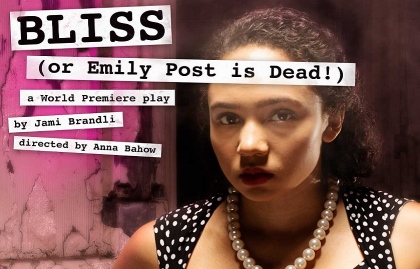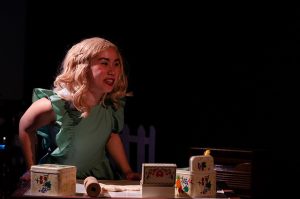CLASSICAL MARTYRS AS NEW JERSEY HOUSEWIVES
MYTHS SOMETHING
Imagine Medea, Clytemnestra, Antigone, and Cassandra transported to a New Jersey suburb in 1960. There the same cycle of repression and revenge repeats itself. The ancient victims — two anti-heroines with loathsome mates, one religious martyr, and a disrespected prophetess — are now, respectively, two pill-popping, grievance-nursing housewives, a demure debutante, and a teenage domestic worker. Somewhat circumscribed by Emily Post’s rules of etiquette, the wrongs of these “nasty women” get reenacted, this time in poodle dresses and with poison crumpets. Very pointedly, they anticipate the inequities of #Me Too, #BlackLivesMatter, and #Never Again.
This is what you’ll find with the oddly named BLISS (or Emily Post is Dead!) by Jami Brandli, now receiving a joint world premiere from Chicago’s Promethean Ensemble Theatre, Moving Arts at Los Angeles’s Atwater Village Theatre, and San Diego’s Moxie Theatre. Pandora’s box just got opened again.
So, is this latest depiction of “everything old is new again” — women making bad choices to prove that they have any at all — worth the whoop? Well, there are some shocks of recognition triggered by The Stepford Wives/Angry Housewives stereotypes who contend with Apollo’s curse as much as modern misogyny. Yes, the ancient/modern corollaries, however clumsy, inconsistent and truncated, produce a few promising juxtapositions. Plus there’s no discounting Brandli’s well-earned anger at the persistence of “pigs.” Nor Anna Bahow’s Midwest premiere, two hours of acting cunning enough to conceal the script’s repetitious and predictable accusations. Somehow it’s not enough.
Anyway, self-medicating Clementine/Clytemnestra (Jamie Bragg) is married to faithless Arthur and addicted to prescriptions from her compliant abortionist doctor (Jared Dennis). Her tea-taking BFF is Maddy/Medea (Alice Wu, doggedly screaming), a well-mannered disciple of Emily Post (“I followed the rules!”). Demure Maddy finds herself saddled with a social-climbing husband who will divorce her and desert the kids to marry the boss’s daughter. (For this born-again consumer, the arrival of a vacuum cleaner is happiness beyond measure.) Bobbysoxer Antonia/Antigone is the next-door neighbor who’s possessed by “darkness” and a crush on an African-American boyfriend. Her uncle Creon, the town’s “dry-cleaning king,” does not approve.
Completing this atavistic quartet is working-girl Cassandra (Kaci Antkiewicz), an African-American au pair girl who throughout history has been afflicted by Apollo (also Dennis): The son of Zeus is a pompous and fatuous Olympian haunted by his treatment of Hyacinth and enraged at being rejected by Cassandra, so the preening narcissist is ever eager to reduce Cassandra to an unheeded seer and pariah. To break this curse (“Know your place and fulfill your fate!”), Cassandra must convince one of these abused (and possibly bisexual) spouses to believe her and alter their fates by “owning” their power. This is 1960: Don’t hold your breath.
Once Brandli presents her four personified parallels, she can’t or won’t do much with them. Presumably, it’s plot enough just to combine or keep separate the ancient/modern equivalents. (To really bring the indictments home, there’s an utterly gratuitous reference to 2018 — and to a country that’s lost all norms, moral and national. Please, give us credit for making the obvious connections.)
Diffuse, scattershot, and a tad drawn-out, the arch-to-glib encounters between the women (as well as the kindred woes of Euripides’ Greece and Eisenhower’s America) are only as entertaining as the acting. Here that’s passably amusing at worst and unexpectedly vital at best.
Brandli’s sadly familiar (and determinedly one-sided) exposé of one sex’s endless perfidies and betrayals — nurtured by unearned entitlement and infuriating indifference — is almost its own excuse for being. But BLISS remains the latest play to join the growing canon of “Tell me something I don’t know.”
The whole thing reminds me of the act on The Ed Sullivan Show where an artist tried to keep a row of plates on poles spinning together simultaneously. Here, alas, more than one falls and breaks, a porcelain tragedy.
photos by Tom McGrath, TCMcG Photography
BLISS (or Emily Post Is Dead!)
Promethean Theatre Ensemble
Athenaeum Theatre, Studio 1, 2936 N. Southport Ave.
Thurs-Sat at 7:30; Sun at 2
ends on August 25, 2018
for tickets call 773.935.6875 or visit Promethean or Athenaeum
for more shows, visit Theatre in Chicago











{ 2 comments… read them below or add one }
Some additional problematic elements of BLISS:
• The frequent resort to comedic undercutting of any serious moment, a seeming unwillingness to let a dramatic tone breathe, particularly with the Apollonian scenes;
• no explanation for why Cassandra couldn’t take her own advice and just LEAVE at the beginning to stop the cycle (instead of at the end when the cycle is midway to complete);
• no deep insight into why people might become these archetypal figures this way with or without a god’s influence, or why the gods care, or why Greek tragedies often focus on the immutability of the Fates and their decries (and Apollo, like all gods including Zeus, must bow to the Fates, despite Apollo’s belief that it is he who is setting up this repeating motif of four women);
• no commentary on why these myths might exist at all — calling it misogyny is not enough. (Why do the gods even care?); and
• too much exposition on items that don’t need spelling out (and resulting in that sledgehammer effect).
I also saw the play. Excellent observations indeed!
I hope the playwright considers them if and when she acknowledges the need to rewrite her two-hour “myth-take.”
I particularly agree with the last point about too much clutter that resulted in an embarrassment of distracting “busy-ness” on stage.